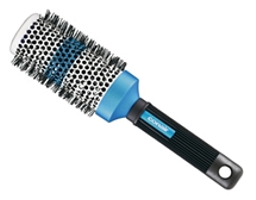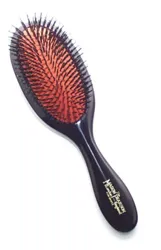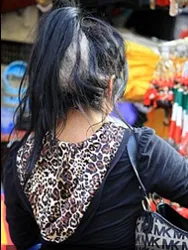
Hair Tangled In A Brush
 Hair Tangled In A Brush - Hair Tangled In A BrushLong Straight Detangled Hair - Image From Depasqualte The Spa
Hair Tangled In A Brush - Hair Tangled In A BrushLong Straight Detangled Hair - Image From Depasqualte The SpaHave you ever gotten hair tangled in a brush?
If you have long or naturally textured hair, you're a likely candidate for battling hair tangles.
People with all, types, textures and lengths of hair can at some point fall prey to hair tangled in a brush nightmare.
How Hair Tangles Happen
All hair serious tangles are tragic, especially if the hair ultimately has to be sacrificed to scissors.
Besides brushes, hair tangles may also happen due to tresses getting accidentally caught in jewelry, wrapped around hair rollers, curling irons or similar curling devices.
Hair may even get tangled in long finger diffusers in some situations.
Hair Tangling Details
When long hair gets tangled in a round brush, it can be disastrous.
Some of the very worst brush triggered tangles tend to occur with a round brushes. All sizes of round brushes can get tangled in hair including small, medium or large.
Hair can become tangled in any section along the scalp from the front of the head along the hairline to the nape of the neck or throughout the perimeter.
Very damaged hair is more prone to tangling when hair which is super healthy.
Sometimes a tangle is allowed to survive without being cutting, it may ultimately become the beginnings of a dread lock. If the brush is not untangled properly, the tangle will only get worse.
Some people have been known to manually cut the bristled off the brush or cut the brush handle off at one end with a hedge clippers.
If you get a hug knot it becomes a huge mess.
Take A Deep Breath & Stay Calm
Unfortunately hair tends to get tangled at the most inopportune times when you getting ready for a special event or you're running late.
Your first response may be sheer panic. Instead of making snap decisions such as grabbing a scissors or frantically grabbing your tresses, take a deep breath and try to remain calm.
If you're on a tight timeline or getting ready for a special event the first goal is to deal with the brush.
Obviously if you're going to a special event such as a wedding, job interview or similar, try to figure out the easiest way to remove the brush and worry about the tangled hair later. You might be able to cover your hair with a hat which hides the brush and the tangle.
If you can't untangle the brush or knot before bed, carefully wrap your head in a bandana so it won't get worse while you sleep.
Work Slowly & Carefully
Wait until you're feeling calm and have some time to address the knot. If you're tense it'll only make matters worse.
When possible have friends or family help you untangle it. Try not to remove the brush yourself or it might only get worse.
Many find that detangling is easier on dry or only slightly damp hair for me. It may vary according to hair type, texture and length. Work slowly and carefully. Try to separate the knot into smaller sections if you can.
Oil, Oil & More Oil
A wide range of techniques and products work for dealing with hair tangles. Some find they achieve the best results with rinse-out, leave-in or deep conditioners.
Others find success with wide tooth combs, the long handle of a tail comb, fingers or hair picks. Chopsticks, hair sticks or even a long smooth pencil can be used to pull the hair out of the brush.
Most people with serious brush or related tangles find oil to be the overall best detangling tool. Olive oil seems to be the oil of choice, but any type oil can be tried ranging from jojoba or almond oil to everyday corn oil used in cooking.
When oil is used, don't be afraid to use lots of oil. You may even want to dip the tangled section into the oil. Don't worry about using too much oil.
Remember, you can also wash the excess oil out of your hair when the knot is removed. While the oil may make your hair feel slippery, that's actually helpful for removing the knots.
Step By Step Detangling
Oil your hair and then work from the bottom up, dividing the tangle into ever smaller sections. Never tackle a tangled section wide than the brush. Many find the best success using a hair pick or the tail or a long tail comb to divide and conquer.
Gently pull out any loose strands and working with small sections, try to release tangle hair starting from the outside and working inward. As you progress through the knot pin up newly detangled strands to get them out of the way.
Pull the hair out of the brush little by little. Don't try to unroll it because it's going to get more tangled which is the last thing you need. Slowly start pulling the hair off the brush.
Be patient. Take time for every little tangled section.
Don't worry, patience wins the race.
When All Else Fails
Try lubricating the knot. Work slowly in small sections. If you don't see results, you may need to cut out the brush.
When the knot covers a large section of hair call your professional hair stylist and ask their help in cutting out the brush and/or knot in the least damaging way.
Remember, it's better to cut the brush and knot out then to break all the hair surrounding it.
Avoid Future Situations With Hair Tangled In A Brush
Once you've lived through hair tangled in a brush you probably won't want to repeat the experience.
Follow the steps below to avoid future tangled:
1. Never wait longer than 24 hours to detangle your hair with a hair friendly brush, comb or your fingers.
Believe it or not, some people wait days if not weeks without detangling. Knots are a guaranteed side effect of not routinely detangling.
2. Always detangle hair before getting it wet or cleansing.
3. Once hair becomes tangled due to wind, rain or other climate exposure, stop and detangle immediately4. Avoid situations where you know your hair will be at risk for tangling.
If you know you're going to be out in the wind or in a situation with high tangle potential, secure hair in braids, hair clips or similar to protect tresses.
Summary - Hair Tangled In A Brush
Your brush may be the problem. Select one with a straight tip.Social Media Network Information
Please follow us on Twitter at: https://Twitter.com/HairBoutique. I look forward to meeting new people from all walks of Twitter and learning from their Tweets.

















